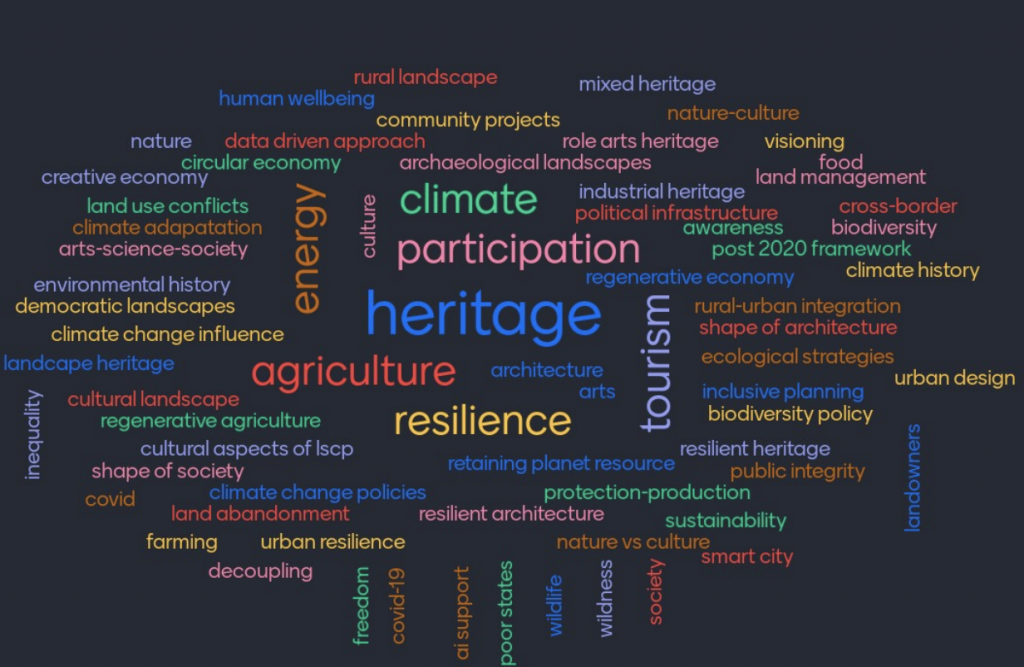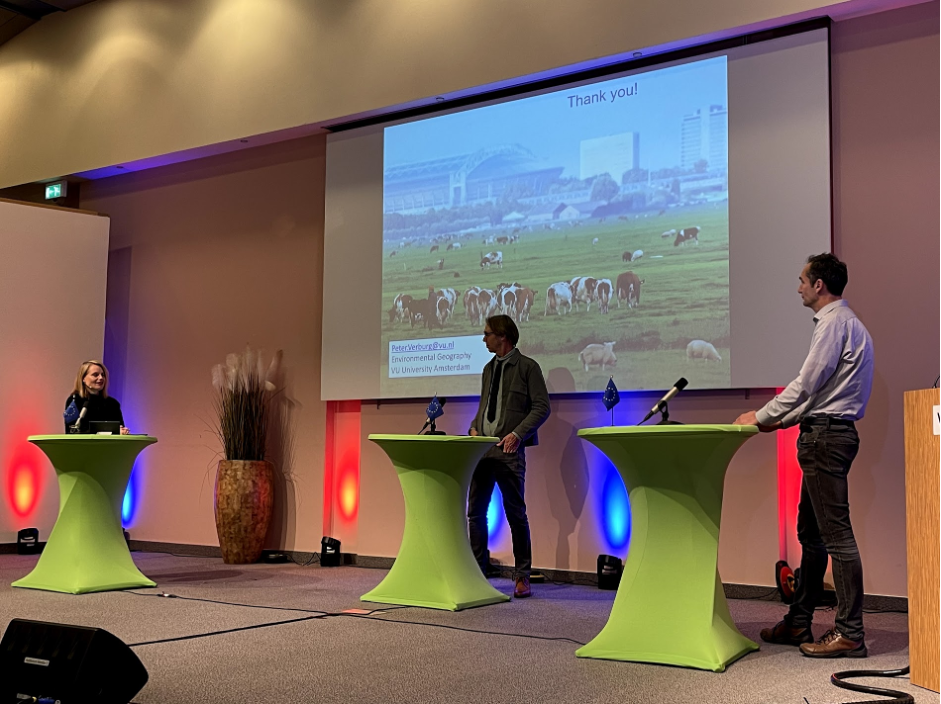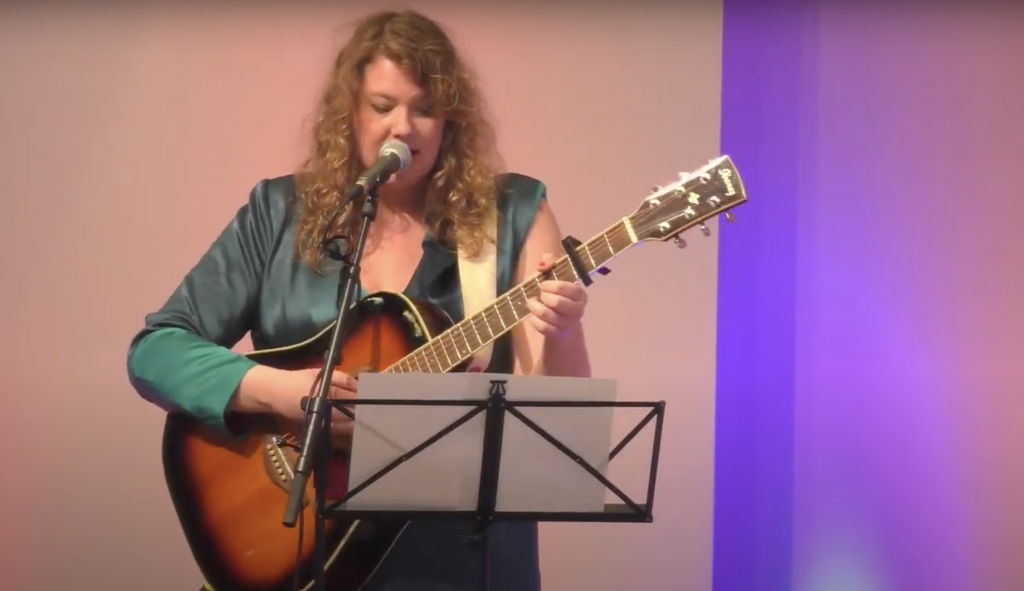On Wednesday the 24th of February, Marie Skłodowska-Curie projects TerraNova and Heriland presented the Future Landscapes Symposium. The symposium was broadcast live on YouTube from the Auditorium at the Vrije Universiteit Amsterdam and hosted by sustainable lifestyle expert and professional presenter Marieke Eyskoot and Heriland project coordinator Niels van Manen.
The symposium was opened by Susan Lêgene, Dean of the Faculty of Humanities at Vrije Universiteit Amsterdam, who welcomed the audience in this virtual environment and wished them fruitful discussions. To initiate the discussion, the presenting duo introduced Mentimeter, a digital tool for audience participation. Through this tool, they were able to deduce the audience’s locations and professional backgrounds, as well as the topics they hoped would be discussed in the following sessions. An interesting finding was the audience believed civil society and scientists should be about evenly influential in decision making. The next question revealed that the majority of audience members belonged to the scientific community. Lastly, in the audience’s preferred themes of discussion, there was a mix of nature- and culture-based topics: an even split between the approaches of Heriland and TerraNova.

Session 1: TerraNova
To introduce this project, TerraNova’s teaser trailer was premiered, in which the voices of all ESRs were incorporated. After that, part one ‘Landscapes of the future – understanding past and current energy regime transitions’ commenced with a talk from project leader Sjoerd Kluiving and videos by ESRs Elena Pearce and Alexandre Martinez. Following their substantive presentations, there was a live moment on Zoom to reflect on audience opinions voiced through Mentimeter in a discussion led by Marieke Eyskoot. The audience was able to affirm the question ‘can we learn from past landscapes to answer global challenges?’ positively after this block of talks.

The second part, ‘The future of Europe’ according to TerraNova’ saw talks by Peter Verburg and ESRs Catherine Fayet and Leen Felix. This session was nicely summarized by Peter Verburg in the discussion: “Our relationship with the land, how we deal with the land, which we have always seen as a resource we can take from, has to drastically change. In that way, I would also provide an argument for stepping away from the past.” Through these talks and discussions, the TerraNova researchers were able to place themselves and their research into the framework of the symposium and the relevance of learning from the past in the creation of sustainable future landscapes.
Session 2: Heriland
The Heriland session was opened by project leader Gert-Jan Burgers, who introduced the project, in which he was assisted by ESR Anna Tonk and her video presentation and later live on Zoom in the discussion of audience questions. Then Marilena Mela presented her research both in video form and on Zoom in a discussion with her supervisor Linde Egberts, who was present in the studio and convincingly stated: “We need to move beyond the mindset of valuing the past and seeing that as a reason to stop change and rather say how can we use heritage and cultural values to actually move forward”. For the last set of topics, Pirouz Nourian and Nan Bai from the TU Delft showed their video presentations on the appeal of small world landscapes. In his concluding remark, Gert-Jan Burgers called for the need for awareness and recognition of other people’s visions in collaborating towards future landscapes: a good teaser for the debate between TerraNova and Heriland representatives in session 3.
Session 3
At the start of the third session the Heriland introduction movie was also premiered. After a short synthesis by Marieke Eyskoot and Niels van Manen, professor Michael Turner could start his keynote. He shared his vision on Sustainable Futures from his experience as the UNESCO Chair in Urban Design and Conservation Studies. At this point, the live chat on YouTube had produced fruitful discussions among viewers and various questions which were later answered in the Q&A with Michael Turner. Finally, a debate between Linde Egberts, Gert-Jan Burgers, Sjoerd Kluiving and Peter Verburg took place. The presenting duo asked them to reflect on the role of their ITNs in relation to the Sustainable Development Goals. The takeaway from the symposium was voiced by singer-songwriter Kiki Schippers, who had written an original song live from the studio. She presented the day as a meal with many courses, where each researcher brought something new to the table. Her chorus said it all: “we have to change our landscapes, our foodscapes to begin!”


